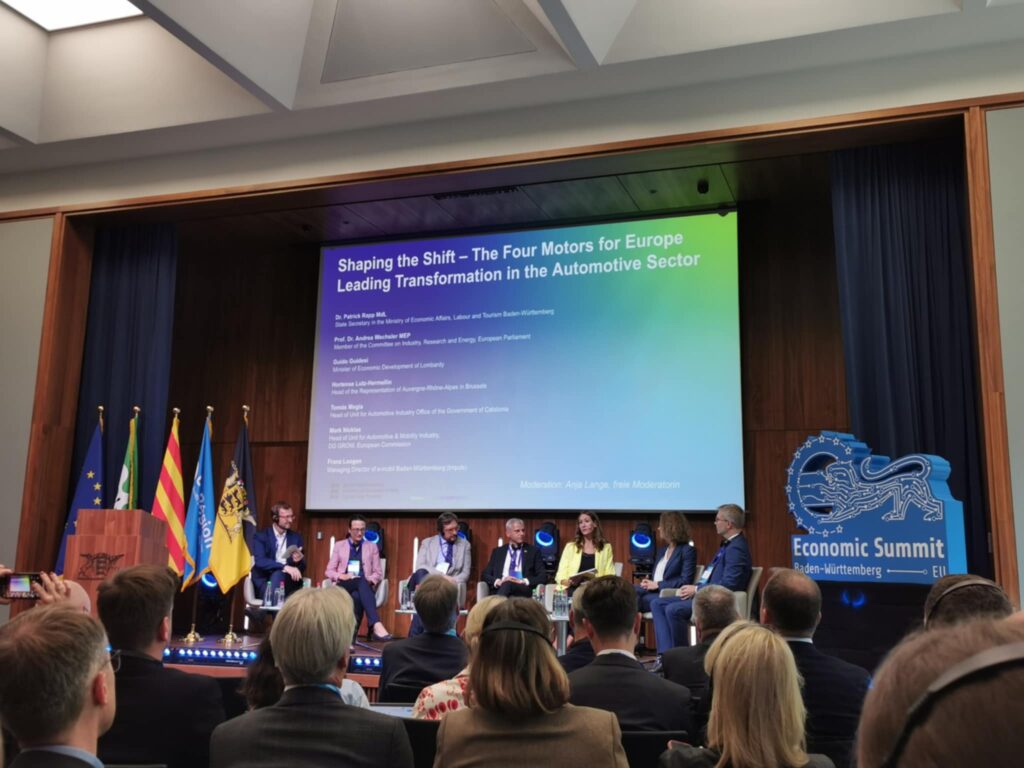Economic Summit 2025 Baden-Württemberg: Shaping Europe’s Industrial and Technological Future
03/10/2025

On 1–2 October 2025, Baden-Württemberg, a member region of EARLALL, hosted the Economic Summit Baden-Württemberg – EU 2025 under the theme “New Realities: Impulses for Europe’s Competitiveness.” The event brought together leading political figures, business representatives and industry experts to discuss Europe’s industrial transformation and competitiveness. Over two days, discussions ranged from the future of the automotive sector to hydrogen technologies in relation to Europe’s role on the global stage.
The first day of the Economic Summit was by Dr. Patrick Rapp, State Secretary in the Ministry of Economic Affairs of Baden-Württemberg. Rapp highlighted the automotive industry as both a barometer for regional economies and a driver of innovation. He stressed the need to “scale innovative power” while maintaining strong positions in European markets.The speech was followed by the panel “Shaping the Shift – The Four Motors for Europe Leading Transformation in the Automotive Sector”, moderated by Anja Lange.Speakers offered complementary perspectives to Rapp’s speech. Hortense Lutz-Hermellin, Head of the Auvergne-Rhône-Alpes Representation in Brussels, emphasised the challenges of international competition and the importance of investment in skills and hydrogen technologies. And Guido Guidesi, Minister of Economy of the Lombardy Region, continued by addressing structural challenges in production and market dynamics. Tomàs Megía, Head of the Automotive Industry Office of the Government of Catalonia (EARLALL’s member region), outlined regional cooperation strategies to foster new technologies and reinforce existing capabilities. Prof. Dr. Andrea Wechsler, MEP, underscored parliamentary attention to the sector’s transformation, particularly in transitioning to electric and hydrogen-powered mobility. Mark Nicklas, Head of Unit for Mobility at the European Commission’s DG GROW, highlighted the role of European regulation in relation to value chains, to ensure competitiveness and secure employment.
Throughout the day, sessions included “Scaling Hydrogen Technologies: Opportunities and Challenges for Europe”, which examined the industrial ramp-up, policy frameworks, and cooperation scenarios necessary to achieve a robust hydrogen ecosystem by 2030. Another panel, “Simplification for a Competitive Single Market”, focused on reducing bureaucracy and promoting investment. Sharing best practices and examples from the Enterprise Europe Network. The evening session, “Europe’s Role in the World”, addressed geopolitical tensions, global competitiveness, and Europe’s ability to assert its technological and economic sovereignty. Across these sessions, speakers consistently emphasized collaboration between regions and industry as well as EU institutions as essential for resilience and innovation.
The summit continued on 2 October with a discussion focused on Europe’s technological sovereignty. Dr. Nicole Hoffmeister-Kraut, Minister for Economic Affairs, Labour and Tourism of Baden-Württemberg, set the tone for the panel with her speech, where she highlighted the need to combine regional strengths with EU-wide coordination, invest in SMEs and maintain competitiveness across all sectors within technology. Industry leaders echoed the urgency of scale-up and investment. Andreas Schwarz, Head of Cabinet of European Commissioner Ekaterina Zaharieva, underlined that Europe creates many start-ups but lack in upscaling, calling for a European fund to close the investment gap. Thomas Bürkle, President of the Entrepreneurs Association of Baden-Württemberg, agreed, emphasising stronger clusters and synergies. This discussion was continued by Corinna Schulze, Head of Government Affairs at SAP, and Dr. JaaneSeehusen, ZEISS Semiconductor Manufacturing Technology GmbH, pointing out the challenges around regulation, chemicals and supply chains, noting that Europe must secure raw materials and support business-to-business innovation.
From the European Parliament, Marie-Agnes Strack-Zimmermann argued that Europe must regulate emerging technologies carefully. Legislation are necessary, but overregulation could stifle innovation before it matures. She also stressed the security dimension, noting that defence research has historically delivered critical technological advances for society.The panel ultimately converged on the view that Europe’s technological sovereignty requires coordinated action across member states, industries and research institutions.
The Economic Summit Baden-Württemberg – EU 2025 reinforced a shared message: Europe’s industrial and technological future depends on strong collaboration between regions, the EU and the private sector. Adaptability and strategic investment will be crucial to secure jobs and advance Europe’s position on the global stage.

